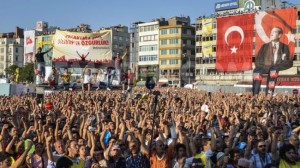[caption id="attachment_37630" align="alignright" width="180"] Turks participate in an anti-government festival called ďMan Made of Tear GasĒ held on the shores of the Kad?koy district on the Asian side of Istanbul on July 7, 2013.[/caption]
Turks participate in an anti-government festival called ďMan Made of Tear GasĒ held on the shores of the Kad?koy district on the Asian side of Istanbul on July 7, 2013.[/caption]
Turkish nationalists have taken to the streets of Istanbul to protest against a series of reforms introduced by Turkish Prime Minister Recep Tayyip Erdogan.
On Saturday, the Turks staged a demo, organized by the opposition Nationalist Movement Party (MHP) in Turkeyís largest city.
The Turkish governmentís reforms include the abolition of a nationalist oath recited by school students, the broadening of language rights, and permission for villages to use their original Kurdish names.
Erdogan and his government have said that they believe the student oath is a reflection of fascism and is full of militarist expressions.
"Lining up kids every morning and making them chant slogans from the 1930s, the Cold War and the era of the Iron Curtain, is not nationalism. Nationalism is building classrooms where those kids can receive education in humane conditions," said Erdogan during a mass opening ceremony in Adana on Saturday.
ďNationalism is not carried out through speeches filled with hate," added the Turkish premier.
On Monday, the government announced a reform package in an effort to protect peace process with Kurdish militants in the country.
The nationalists, however, accuse the government of succumbing to demands by the Kurdistan Workers' Party (PKK).
"According to the prime minister and his government, our oath is a reflection of fascism. [They say] it is filled with militarist expressions. I am addressing the prime minister and his team of tyrants. Whatever you think, the Turkish people will protect their oath," said MHP leader Devlet Bahceli during Saturdayís demonstration.
On Monday, the MHP leader criticized the reform plan strongly, saying, "Separatism has gained more ground with this package."
In March, PKK's jailed leader Abdullah Ocalan declared a historic ceasefire after months of negotiations with the Turkish government.
In return, the PKK demanded amendments to the penal code and electoral laws as well as the right to education in the Kurdish language and a degree of regional autonomy.
But in September, the PKK announced they were planning to suspend the ceasefire, accusing Ankara of failing to deliver the promised reforms.
The PKK has been fighting for an autonomous Kurdish region in southeastern Turkey since the 1980s. The conflict has left tens of thousands of people dead.
By Press TV
The Iran Project is not responsible for the content of quoted articles.

 QR code
QR code